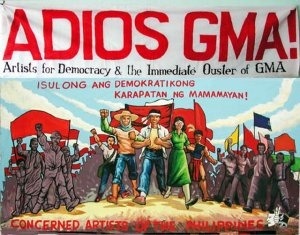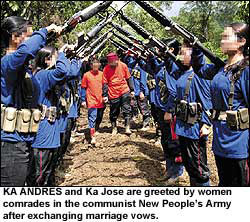“Hello, Garci. . . . Will I win by one million votes?” is ringing on cellphones throughout the Philippines. It is the taped voice of President Gloria Macapagal Arroyo talking with commissioner of elections Virgilio Garcillano, nicknamed “Garci” in May 2004 before the election results were announced. Arroyo did, in fact, win by a million votes.
After three weeks of silence on the tape scandal, Arroyo admitted on June 28 that she committed the indiscretion of talking to an election official and called it “a lapse in judgment.” Such is the long history of “dagdag-bawas,” a Tagalog expression for “vote padding and shaving” that is virtually a given as the ruling elite pass the presidential baton from one clan to another. Never has a person been elected to the presidency without being part of the top one percent of the Philippine ruling elite, nor without the blessing of the U.S. government. This time the U.S. is backing Arroyo, emphasizing that the “rule of law” must be followed. It is utterly terrified of another “People Power” that ousted two U.S.-backed Philippine presidents before.
 Tens of thousands of people have taken to the streets to demand that Arroyo resign or be ousted. Pressure is growing from the mass organizations of the Left, opposition political parties, organizations of professionals, church people, business groups, and retired military and police officers.
Tens of thousands of people have taken to the streets to demand that Arroyo resign or be ousted. Pressure is growing from the mass organizations of the Left, opposition political parties, organizations of professionals, church people, business groups, and retired military and police officers.
While political insiders want to replace Arroyo with her equally reactionary vice-president,  the mass grassroots organizations advocate forming a “Transition Council” that would include representatives of the poor and marginalized sectors of Philippine society. The Transition Council would put into place meaningful electoral and political reforms; render justice to victims of human rights violations; resume the peace process with Muslim and Communist revolutionary groups; and repudiate the Philippines’ onerous debts.
the mass grassroots organizations advocate forming a “Transition Council” that would include representatives of the poor and marginalized sectors of Philippine society. The Transition Council would put into place meaningful electoral and political reforms; render justice to victims of human rights violations; resume the peace process with Muslim and Communist revolutionary groups; and repudiate the Philippines’ onerous debts.
Poverty, Puppetry, and Unofficial Martial Law
These political tasks point to the grinding poverty, injustice and state terror that the Filipino people are living under. Nearly 60% of the annual budget goes to pay off the foreign debt and to pay for the bloated military and police forces. In order to raise more funds, the government has welcomed foreign multinationals. To cite one example, US, Canadian and Australian mining operations have destroyed the ancestral lands of hundreds of indigenous communities in recent years. At the same time, the Filipino government’s central “labor policy” is to export human labor. More than 8 million people, or 10% of the population, have been forced to look for work abroad in 162 countries. Their remittances to their families in the Philippines keep the economy from sinking.
When over 85% of the population lives below the poverty line, resistance is inevitable. Struggles by peasants for higher prices for their crops, by women for divorce rights and reproductive freedom, and demands for U.S. troops to get out of the Philippines have all mushroomed. For example, the GABRIELA national alliance of women’s organizations has over half a million members! Together, these BAYAN-related groups have elected six representatives to Congress, where they fight for the people’s interests and expose how the government operates. Other leftist groups have several representatives in Congress.
President Arroyo and the militarists in her administration are seen as joined at the hip with the US Embassy. She was the first government leader in Asia to join Bush’s “anti-terrorist” crusade in late 2001. Since then, Arroyo and the Philippine Army have hosted anywhere from several hundred to 5,000 US troops for “joint training exercises.” The US troops have been rotated in and out to get around the provision in the Constitution barring foreign military bases on Philippine soil. On the other hand, an undetermined number of US Special Forces, military intelligence and CIA agents are permanently based in the Philippines, with the knowledge and protection of the Arroyo government.
Faced with millions of oppressed, increasingly conscious people, the Arroyo regime has unleashed the army and national police against legal grassroots organizations. In the first six months of 2005, soldiers and their unofficial death squads have killed over 35 activists in various provinces. This includes members of BAYAN, GABRIELA, church leaders, lawyers, Anakbayan (youth), and the electoral party Bayan Muna.
In November, 2004, seven striking farmworkers were shot down by soldiers on a picket line at the Hacienda Luisita plantation in central Luzon. No justice has been forthcoming from the Arroyo government or from the big landlord family (which ex-President Cory Aquino is part of) that owns the plantation. In much of the countryside, there is unofficial martial law.
The Revolutionary Movement in the Countryside
The Filipino people are not only fighting with picket lines and demonstrations. In every major island of the Philippines, the Communist Party of the Philippines (CPP) and the New People’s Army (NPA) are building a mass revolutionary movement aimed at toppling the Arroyo government. In 130 guerilla fronts, the NPA organizes peasants to fight for their needs, and indigenous peoples to defend their lands and cultures. It institutes health care and education and conducts military operations to weaken the army and seize weapons.
In many areas, this has cleared the way for new forms of revolutionary political power based on a national democratic program. This new government, the National Democratic Front of the Philippines, has an office in the Netherlands and has been engaged on and off in negotiations with the Republic of the Philippines.
 The New People’s Army was recently in the Philippine newspapers when they invited reporters to attend the first gay marriage in the NPA — an important accomplishment in a heavily Catholic country. And many CPP statements are made by the legendary “Ka Roger,” who regularly speaks on afternoon radio shows in Manila via mobile phone. In spite of the army’s constant attempts to track Ka Roger down, he continues to be the Philippines’ version of New York City’s Larry Davis, the “dude who elude.”
The New People’s Army was recently in the Philippine newspapers when they invited reporters to attend the first gay marriage in the NPA — an important accomplishment in a heavily Catholic country. And many CPP statements are made by the legendary “Ka Roger,” who regularly speaks on afternoon radio shows in Manila via mobile phone. In spite of the army’s constant attempts to track Ka Roger down, he continues to be the Philippines’ version of New York City’s Larry Davis, the “dude who elude.”
In order to deny the Arroyo regime an excuse to call in the army against the current wave of demonstrations in Manila, the CPP and NPA have announced that they have instructed their units to remain in the countryside and to step up tactical offensives against the army. This policy helps to pin down as many enemy soldiers as possible in the rural areas, and encourages the Oust Gloria movement to develop as fully as possible in the large population centers.
At the end of a recent statement, the CPP wrote: “For the Filipino people, the crisis besetting the Arroyo regime is a good thing. It opens the possibility of advancing their most urgent demands. More importantly, it provides the conditions for pushing forward the people’s war closer to final victory.”
Dave Pugh is a public school teacher in New York City.
